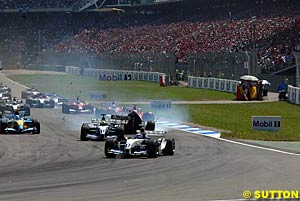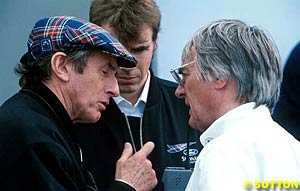
Atlas F1 Columnist
This week's Grapevine brings you |
Following the FIA's decision to penalise Ralf Schumacher ten places at his next qualifying for causing the first corner accident at the German Grand Prix, there has been concern - and not only at Williams. It seems the team are going to receive support from a surprisingly wide selection of their rivals.
Schumacher was moving to cover his racing line, in order not to offer Kimi Raikkonen a chance to drive at him coming out of the corner: had he not done so, it is unlikely the accident would have occurred. However, his action was not sudden or malicious, was in keeping with the normal accepted practice of the driver clearly in control taking a racing line, and it was something that has happened at the front of almost every race start this year.
Raikkonen, having ran wide - venturing to the outer limits of the track - to pass Rubens Barrichello, was edging back in, looking to get back on to the circuit to be sure of braking successfully for the corner. Had he held his line, Barrichello would have had longer to react to Schumacher's continued move to the left, and the incident could have been avoided. Barrichello himself was hardly a passenger for the entire incident. Like any driver in his situation, looking to recover from a less than perfect start, he was aiming to be in the best position possible for the corner. He was on the racing line, and if he carried sufficient speed through, he could hope to get a good run at whoever was in front of him coming out of the corner. Then again, had he backed down, he would not have been sandwiched between the cars as they closed.
None of the drivers were doing anything that had not been done at earlier events this year, let alone previous seasons, and each, in the same situation, would attempt the same thing. All of the drivers were racing for position, all were experienced, and none considered anything that happened to be bending the rules of racing as they understand them.
Just as importantly, the drivers' positions are backed up by their teams, who are paying them to race, which means they will make life awkward for the competition and not provide holes 'in case' someone else fills it: needless to say, they want to know the basis for the penalty. They all concede that Schumacher's position on the track effectively gave him 'ownership' of the corner, and provided he did not swerve to keep anyone behind, he was entitled to take any reasonable line through it. If the FIA's penalty states that he was negligent for failing to account for other drivers on his outside, what does it mean for others who make positional changes at the start of the race? And does it mean that the current practice of moving back out towards the racing line, having defended the inside line to a corner, will result in penalties? If not, should it, in order to maintain consistency?
Then again, there were other incidents in the race - Michael Schumacher's pass on Jarno Trulli came as a result of the Ferrari driver running wide at a corner, then muscling his way back on. Trulli then prevented David Coulthard from repeating the manoeuvre by refusing to make space for him on the track, so the Scot was compelled to yield and fall in behind. It was considered 'racing' at the time, but both cases illustrate a driver deliberately forcing another to take avoiding action: should there have been an appeal? Or a penalty applied in hindsight?
The front running teams now looking to see what happens during the appeal process for answers to their questions - especially as the politics of the situation are fraught. Not only do they need clarification on why the penalty was given, but should the FIA maintain a ruling that disadvantages Schumacher by ten places at the next event when Williams are dominant and closing on Ferrari's points lead, they will again open the door to accusations of tampering to ensure a close finish to the season.
With demand for Formula One races continuing to be high, Bernie Ecclestone has a lot of events to play off against each other as he works to set dates for the new calendars. This season comes with a reorganisation that should even see the US GP moved - a notorious headache - as part of short 'summer season' in North America.
Gaining agreement from the teams is proving awkward so far: only half have agreed in principle to the idea, and even then, all bar one have strings attached. Obviously, the first thing every team have asked for is more cash in order to pay for the costs of staging the extra race: transport costs have to be met, as do the running costs of the car which must be available for an extra race weekend. If any damage occurs, then it has to be repaired. If drivers are paid on a points scored or win-bonus basis, then extra payouts might be required. All told, running a Championship event is an expensive business.
Then again, consideration is required for the team members who are working at the races: it is a tough and hectic season as it is. Adding another event - probably long-haul - is going to make their job harder and keep them away from home longer. If the extra race extends the season, then there will be more development work required on the cars, and more testing to prove the developments work as expected - and that is in parallel with work on new cars.
With the back end teams struggling to manage the current season, they are arguing that payments should be scaled so that the smallest teams see the biggest rewards for complying. Simply increasing the payouts agreed under the Concorde Agreements by a seventeenth would hand even more money to the front runners, making the inequity even tougher to fight. Needless to say, there is plenty of bickering going on.
Ironically, the best stick that Ecclestone has for persuading the teams to accept the extra event is to threaten a race that most of them actually want to attend: it would bring the calendar back to the maximum seventeen races without the arguments! Threatening the British Grand Prix is proving effective leverage with most of the teams, as many consider it their home event, but it is also supposed to be part of the manoeuvering over the future of Imola too.
It's little surprise, then, that sorting out next year's calendar has been giving Ecclestone a headache.
![]() Surprise at Schumacher's Penalty
Surprise at Schumacher's Penalty
 Given that all the drivers who were caught up in the incident absolved themselves of blame, then failed to blame anyone else directly, it was widely considered the event a racing incident, with all those involved already punished by being knocked out of the race. Watching the events on replay, it is apparent that some blame could be apportioned to each of the three drivers involved.
Given that all the drivers who were caught up in the incident absolved themselves of blame, then failed to blame anyone else directly, it was widely considered the event a racing incident, with all those involved already punished by being knocked out of the race. Watching the events on replay, it is apparent that some blame could be apportioned to each of the three drivers involved.
![]() Making Dates for the Diary
Making Dates for the Diary
 Ecclestone's headaches these days are coming from a different direction. Facing a calendar that is limited to seventeen events by the Concorde Agreement, unanimous agreement from the teams is a requirement for increasing the number of dates on the calendar - and presently, he is attempting to get eighteen on to next year's agenda.
Ecclestone's headaches these days are coming from a different direction. Facing a calendar that is limited to seventeen events by the Concorde Agreement, unanimous agreement from the teams is a requirement for increasing the number of dates on the calendar - and presently, he is attempting to get eighteen on to next year's agenda.
Please Contact Us for permission to republish this or any other material from Atlas F1.
|
Volume 9, Issue 32
Articles
The Rollercoaster Rider
Jordan Vs. Vodafone: The Judgement
Ann Bradshaw: View from the Paddock
2003 German GP Review
2003 German GP Review
That Michelin Magic
Chops and Changes
Stats Center
Qualifying Differentials
SuperStats
Charts Center
Columns
Season Strokes
Elsewhere in Racing
The Weekly Grapevine
> Homepage |